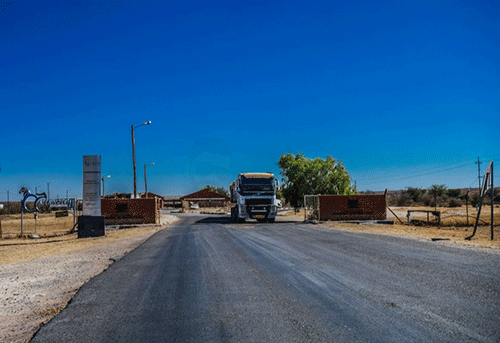The regional councillor for the Kalahari Constituency in the Omaheke Region, Ignatius Kariseb, believes that development at the border town of Buitepos must be prioritised to transform it into an economic and multi-dimensional investment hub.
“The settlement is awake and not fast asleep in light of development, investments and economic growth. The economic potential of Buitepos can be harnessed from its geo-economic strategic position and economic resource base, or it can be benchmarked with other border towns in Namibia, Africa and globally to fulfil its economic potential and development prosperity,” he told New Era yesterday.
Kariseb stated that town planning for the Buitepos settlement is under review. “A new town planning modelling and scheme is at an advanced stage, ready for submission to relevant authorities”.
According to the councillor, they have received a number of business investment applications and proposals in various areas, and are working on revitalising a Memorandum of Understanding with Botswana on economic development cooperation as well as inter-governmental relations.
Buitepos in the Omaheke Region is around 310 kilometres east of the nation’s capital Windhoek, situated along the B6 national road, which forms part of the Trans-Kalahari Highway.
According to information from the Namibia Revenue Agency (NamRA), about 500 travellers make use of the border post to leave or enter Namibia on a monthly basis, with the majority being incoming travellers.
“The estimated revenue collection for October 2021 was over N$207 000 in imports and exports. On average, 1800 import trucks and 800 export trucks carrying goods pass through the border post monthly,” NamRa stated.
Outlining the challenges in the area, NamRA pointed to youth unemployment as being prevalent at the settlement. To alleviate this challenge, some of the youth in the area require basic skills in order to participate in the mainstream economy, particularly by taking advantage of opportunities created by cross-border trade.
Kariseb said other challenges in the area include urban land scarcity and land delivery, as well as insufficient and scarce water resources. The settlement relies on underground water supplied by boreholes, where water levels are influenced and affected by natural phenomena such as weather and climate change. However, securing a sustainable, reliable and alternative source of water remains a challenge.
“Moreover, a sustainable alternative source of water supply is the only way forward to support and sustain economic growth and development. Another challenge is sanitation and housing. Basic sanitation remains a challenge to local residents. However, council has invested N$1.2 million and embarked upon an ongoing sewer reticulation and sanitation project in the 2020/21 financial year for the construction of 73 sanitation and ablution facilities. Housing is underdeveloped, with informal structures, but soon in 2022, it will be formalised,” he stated.
The councillor added that sewer and sanitation projects are capital-intensive, and require an appropriate and adequate budget for effective delivery. In this regard, council intends to service about 1000 residential erven at the end of the financial year 2025.
Buitepos has a sustainable and stable, diverse and multicultural population, estimated to be 1300 residents.
According to Kariseb, an annual average of 68 368 light vehicles and 91 127 heavy vehicles pass through Buitepos (2019/20). This traffic mainly comprises international, regional and sub-regional trade volumes and commercial tourism activities.
“To be specific, trade, transport, tourism, agriculture and public services contribute millions and billions of Namibia dollars, and state revenue is being collected through NamRA, who collected over N$200 million per annum. Others who collect more millions include the Meat Board of Namibia, the Agronomic Board of Namibia as well as others,” said Kariseb. – mndjavera@nepc.com.na


